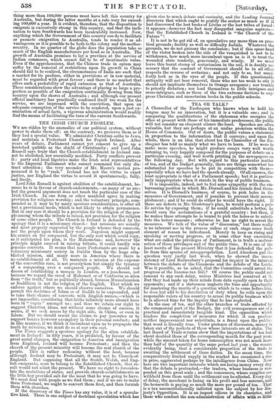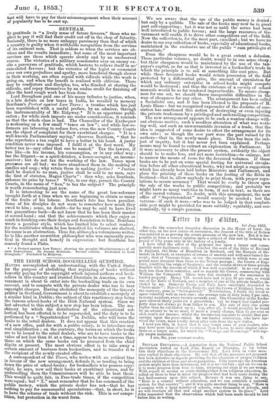TEA OR TALK?
A Chancellor of the Exchequer who knows when to hold his tongue may be an innovation, but it is a valuable one ; and in comparing the qualifications of the statesman who occupies the office at present with those of his immediate predecessor, the public will not consider an eloquent silence the least. Speeches are often valuable, but they are perhaps at an undue premium within the House of Commons. Out of doors' the publics values a statement in proportion to the information that it conveys • and upon the whole, there is an idea that about tea the Chancellor of the Ex- chequer has told us mainly what we have to learn. If he were to make more speeches, he might produce essays very well worth listening to, very happily composed for the purposes of debate on a particular evening, and well worth printing in the newspapers on the following day. But with regard to this particular matter of tea, and of the Budget generally, there are things somewhat too substantial for speeches to be put in competition with them— especially when we have had the speech already. Of all encores, the least appropriate is that of a Parliament speech; but it is particu- larly inappropriate when it stands in the way of public business. It is impossible, indeed, not to feel some sympathy with the em- barrassing position in which Mr. Disraeli and.his friends find them- selves. It is Disraeli's business, of course, to pick holes in the measures of Government, and if possible to prevent their accom- plishment; and if he could do either he would have the right. If there are defects in Mr. Gladstone's plan, he would perform a pub- lic service by exposing them; if he could substitute a better, he would earn the acclamations of a grateful country : but then if he makes these attempts he is bound. to pick the holes or to substi- tute the better measure ; otherwise he has no right to arrest the measures. We talk of the value of "discussion," but there really is no inherent use in the process unless at each stage some fresh element of reason be introduced. Merely to keep on rising and speaking or moving progress, or in some other way exercising what are called the privileges of Parliament, is in truth a malver- sation of those privileges and of the public time. It is one of the least merits of the present Ministry that it has defended the pub- lic from this species of misappropriation. Lord Aberdeen put the question very justly last week, when he showed the incon- sistency of Lord Maim esbnry's proposal for inquiry in the interval between the debate of the Commons and the debate of the Lords. Was it possible, as he asked, that the Committee could arrest the progress of the Income-tax Bill ? Of course the public could not consent to any such delay, unless Ministers had connived at it. But they had made up their minds from data equally open to their opponents ; and if a statesman neglects the time and opportunity for mastering the merits of a question which is to come before him, he does but add to his dereliction of duty when he calls upon the responsible rulers of his country to arrest its public business while he is allowed time for the inquiry that he has neglected. In the case of tea, and the other branches of trade affected by the commercial part of the Budget, the evil consequences are of a practical and immediately tangible kind. The opposition which hinders the completion of measures for which it can produce neither improvement nor substitute, is a fraud upon the public: that word is literally true. Under pretence of discussion' money is taken out of the pockets of those whose interests are at stake. The last Board of Trade returns show that the importations of tea had about doubled those of the corresponding month for the past year, while the amount taken for home consumption was not much more than half of the quantity at the same period last year ; the reason evidently being, that a considerable proportion of the trade is awaiting the settlement of those duties. In the mean time, the comparatively limited supply in the market has occasioned a rise in price, aggravated perhaps by the intelligence from China. Now here are two important interests which are losing money every day that the debate is protracted,—the traders, whose business is sus- pended on this great scale • and the consumers, whose supplies are withheld from them until scale; settlement can be effected. Every day of delay, the merchant is losing on his profit and loss account, and the housewife is paying so much the more per pound of tea. That is a tax unconstitutionally inflicted upon the subject by her Ma- jesty's Opposition. It is an impost odious in its character, and those who conduct the non-administration of affairs with so little
tact will have to pay for their mismanagement when their account of popularity has to be oast up.



























 Previous page
Previous page